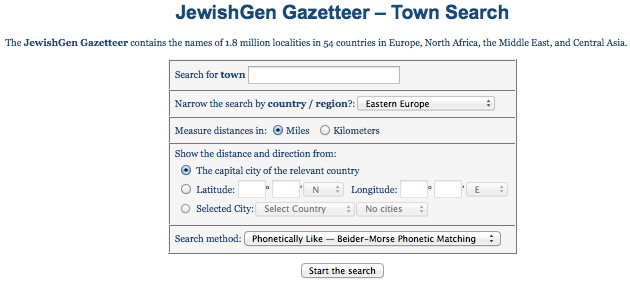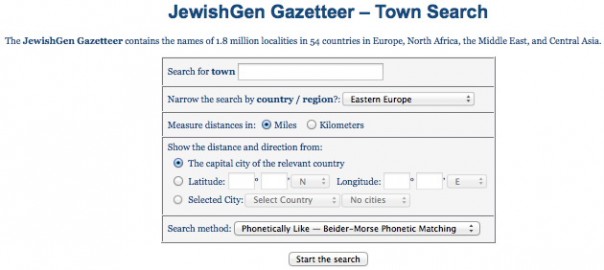
JewishGen has changed the name of two of its major site features, in both cases removing the word Shtetl, although for slightly different reasons.
JewishGen Gazetteer
First, they have changed the name of the JewishGen ShtetlSeeker, their large database of place names (as opposed to the smaller more focused JewishGen Communities Database), to the JewishGen Gazetteer.

This change reflect the fact that the database covers much more than Shtetls, which are generally considered small towns or villages with large Jewish populations. The Gazetteer contains 1.8 million place names (compared to about 6,000 in the Communities database). A gazetteer is a geographical index or dictionary, and more properly reflects the fact that the database covers all the cities, towns, administrative districts, etc. as well as mountains, rivers, and other geographical landmarks, in the areas covered by the database.
The new JewishGen Gazetteer also covers more places, including the Scandinavian countries (Denmark, Sweden, Norway and Finland), Spain, Portugal, Luxembourg, Kyrgyzstan and Yemen.
Lastly the Gazetteer also gains some new functionality, including search using the more advanced Beider-Morse Phonetic Matching (in addition to exact, starts with, contains and Daitch-Mokotoff Soundex searches). names shown in non-Latin characters, and names are now listed in the order of relevance.
JewishGen KehilaLinks
Second, JewishGen has changed the name of ShtetLinks to KehilaLinks.

While the site name has changed, it will take time to propagate the changed name throughout all the pages that make up KehilaLinks (since they are created by many different people). The name change reflects two issues, that the database contains larger cities which are not traditionally considered Shtetls (a similar reason to the change of the ShtetlSeeker site) and that in countries outside of Europe, particularly in Sephardi communities and even towns in North America or Israel, the term Shtetl was not used. Thus, the name was switched from Shtetl to Kehila, the Hebrew word for community (which can apply to Jewish communities all over the world).
If you’re not familiar with one or both of these features of JewishGen, I recommend checking them out thoroughly. They are both immensely useful for genealogy, particularly Jewish genealogy. I wrote about both of these features previously (under their former names) in my article Jewish Genealogy Basics: Ancestral Town (Shtetl) Information. Give it a read to find out more about these JewishGen features and how to use them.
